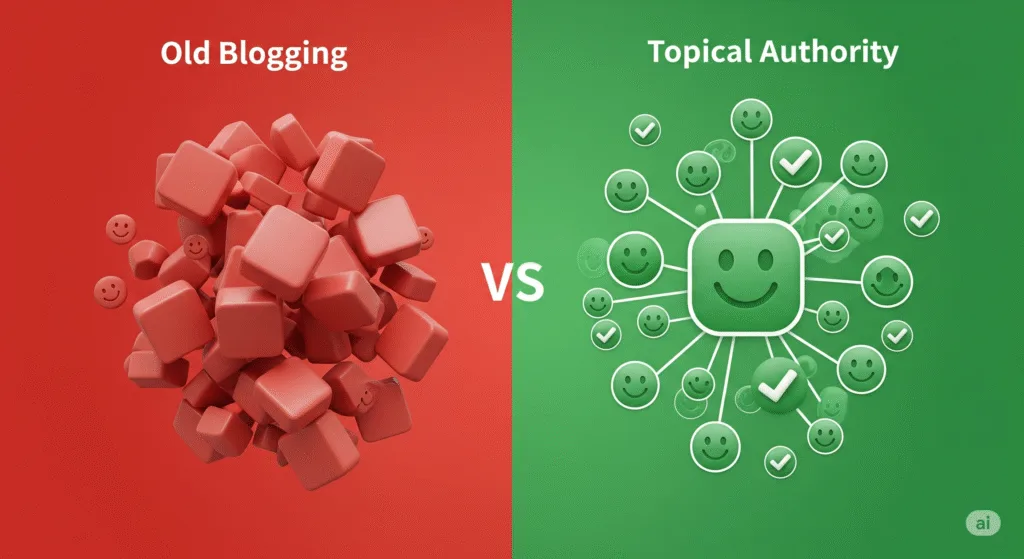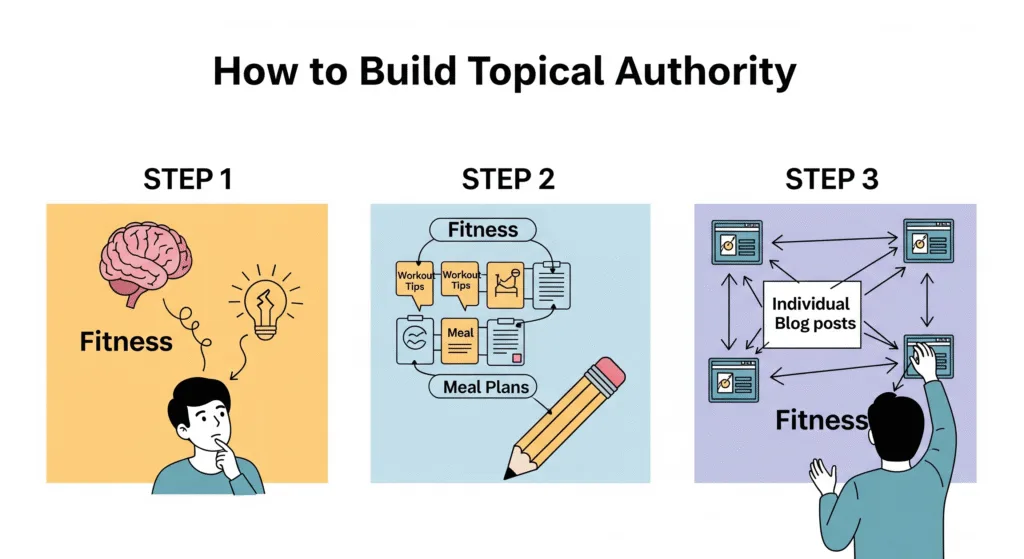In 2025, Google no longer rewards shallow keyword-stuffed content. Google prioritize websites that give depth analysis, expertise, and topical relevance. That is where topical authority comes in.
If you want your SEO blog or business website to rank consistently and grow traffic without chasing every new algorithm update, building topical authority is your best long-term strategy.
“As Google puts it, in 2025, Google favors sites that teach thoroughly, not just rank narrowly.”
In this guide, we will break down what topical authority means, how it works, and how to build it for your niche step-by-step. According to SEMrush, content depth and topical coverage can increase organic traffic by up to 40% compared to isolated blog posts.
How to Build Topical Authority in SEO 2025: Infographic
How to Build Topical Authority in SEO 2025
1. What is Topical Authority?
Be recognized as a subject matter expert by covering topics from all angles. It’s about content depth, not just backlinks.
2. Building a Topical Map
Visually plan all subtopics within your niche. Break down main topics into subtopics and content ideas. Use tools like ‘People Also Ask’.
3. Create Content Clusters
Group related articles around a central pillar page. Link all cluster articles to the pillar and each other for semantic relevance.
4. Tools for Planning & Tracking
Leverage tools like Google Search Console, Ahrefs, Surfer SEO, Frase, NeuronWriter, and SE Ranking to optimize and track progress.
5. Publishing Strategy
Publish content in groups, not one-offs. Be consistent, prioritize user intent, and regularly refresh old content. Use a content calendar.
6. Internal Linking & Authority Flow
Strategically link new articles to pillar posts using keyword-rich anchor text. Avoid orphaned pages and improve crawlability.
7. Off-Page Support
Support your topical authority with guest posts, industry directories, content repurposing (videos/carousels), and forum engagement.
8. Common Mistakes to Avoid
Avoid scattered content, focusing only on short-tail keywords, neglecting internal linking, outdated content, and chasing irrelevant trends.
Section 1: What is Topical Authority?
Topical authority means being recognized by search engines as a subject matter expert in a specific area. If your site consistently covers a topic from all angles, Google begins to trust it and rewards it with higher rankings.
Example: If your blog is about “SEO,” you should cover subtopics like: On-page SEO, Technical SEO, Local SEO, AI SEO tools, and Link building by covering these subtopics deeply, your site becomes an authority on SEO, not just another page targeting “SEO tips.”
Topical Authority vs. Domain Authority: Domain authority is based on backlinks and popularity. Topical authority is based on content depth and subject relevance.
A case study by Authority Hacker showed that websites focusing on topical clusters saw a 68% increase in traffic within 6 months. Google’s algorithms, such as BERT and MUM, are built to understand user intent and semantic relationships between topics.
That is why topical depth signals trust, and trust leads to rankings.
Section 2: Building a Topical Map
Before writing, you need a topical map, a visual or written layout of all the subtopics within your niche.
Step-by-Step:
Start with your main topic (e.g., SEO)
Break it into subtopics (Technical SEO, Local SEO, etc.)
Further divide subtopics into content ideas (e.g., “Fixing Crawl Errors” under Technical SEO)
Prioritize based on search intent: informational → commercial → transactional
Tools to use:
Google’s “People Also Ask”
AnswerThePublic
GlooMaps for free visual planning.
Keyword Insights for clustering of search terms into meaningful topics.
The more questions your content answers, the higher the chances it will appear in Google’s “People Also Ask” box?
Section 3: Create Content Clusters

A content cluster is a group of related articles linked to a central pillar page.
Structure Example: Pillar Page: SEO for Small Businesses
Supporting Posts: Local SEO Checklist, Optimizing Google My Business and Affordable SEO Tools.
Link all cluster articles to the pillar page and between each other using keyword-rich anchor text. According to Moz, content clusters help increase site dwell time and improve semantic relevance for ranking.
Example Cluster for “Technical SEO”:
Core Web Vitals explained, How to fix crawl errors?, Mobile-first indexing checklist and Sitemap vs Robots.txt explained
Section 4: Tools for Planning & Tracking
Use these tools to discover gaps and track progress:
Google Search Console: See which topics get impressions but no clicks
Ahrefs (ahrefs.com): Analyze competitors’ topical coverage
Surfer SEO (surferseo.com): Optimize content using NLP
Frase (frase.io): For content outline & topic scoring
NeuronWriter: Advanced semantic writing tool for AI-driven topic coverage
SE Ranking (seranking.com): Offers topic grouping and content scoring
Stat: Sites using AI-assisted tools like Frase saw 2x faster content production and 30% more SEO clicks on average in 2024 (Frase.io).
Section 5: Publishing Strategy

To build topical authority post in groups, not one-offs and do not publish only one article about Technical SEO, but publish five. Consistency is key factor and use a similar format for each topic (H1, H2s, intro, TOC).
Prioritize intent, cover beginner, intermediate, and advanced questions and refresh content also update old posts with new data, links, and structure. Maintain a content calendar using tools like Notion or Trello to manage content progress by topic.
Google favors freshness. Updated content has a 30% higher chance of appearing in top 3 results, according to Backlinko.
Section 6: Internal Linking & Authority Flow
Google uses internal links to understand content structure. A good internal linking strategy spreads authority and improves crawlability.
Best Practices:
Link from every new article to your pillar post
Use keyword-based anchor text
Link across clusters where relevant
Avoid orphaned pages (posts with no links in or out)
Plugins like Link Whisper or Internal Link Juicer can help automate this. According to SEOClarity , relevant internal linking improve keyword rankings by 20% to 30%. Use Screaming Frog to identify orphaned pages and broken internal links.
Section 7: Off-Page Support
While topical authority is built mainly with content, building backlinks still crucial.
Smart tactics:
- Write guest posts that link to your pillar pages
- Get listed in industry directories (for trust)
- Repurpose content into videos or carousels to attract social shares
- Engage in forums like Reddit (r/SEO), Quora, and Indie Hackers with relevant links
Real-world example: G2 notes that combining high-quality content with even 10–15 niche backlinks can double organic visibility in competitive industries.
Section 8: Common Mistakes to Avoid
Avoid creating scattered content on unrelated topics, as it weakens your site’s topical relevance. Instead of focusing solely on short, highly competitive keywords, aim for long-tail keywords that align with user intent they are often easier to rank for and attract more qualified traffic.
Do not overlook the importance of internal linking, strategically linking related posts helps Google better understand your site structure and topical relationships. Failing to update outdated content is another common SEO mistake regularly refreshing older posts ensures they remain relevant and can continue attracting organic traffic.
Also, resist the urge to chase trending topics that don’t align with your core niche, such content may bring short-term attention but hurts your site’s long-term authority and ranking.
All these mistakes reduce Google’s understanding of your website’s focus, ultimately harming your topical clarity and domain authority. Avoid publishing content that cannibalizes existing rankings. Use tools like Screaming Frog or Clearscope to audit content overlaps.
Summarizing How to Build Topical Authority in SEO 2025
Topical authority is not built overnight. But by consistently publishing helpful, well-structured SEO integrated content in clusters and supporting it with internal links and off-page mentions you will gain long-term rankings and trust. Pick 3 core subtopics in your niche, map out 5 posts for each, and begin building your SEO fortress one article at a time. By doing so, you’ll earn not just rankings but recognition, leads, and recurring traffic.
Q1. What is topical authority in SEO?
Topical authority is the process of becoming a trusted source of information on a specific subject by publishing a comprehensive, interlinked collection of high-quality content.
Q2. Why is topical authority important in 2025?
Google’s algorithms now prioritize depth and expertise. Sites that demonstrate broad and deep coverage of a topic tend to rank higher than those chasing isolated keywords.
Q3. How do I build topical authority from scratch?
Start by choosing one core topic. Create a pillar page that covers it broadly, then publish supporting articles answering sub-questions. Interlink everything to show structure and relevance.
Q4. How long does it take to see results from topical authority?
It can take 3 to 6 months, depending on your niche and competition. Consistency, internal linking, and updating your cluster regularly speed up the process.
Q5. Do I need backlinks to build topical authority?
While backlinks help, well-structured semantic content clusters can rank without many backlinks, especially for long-tail queries.


Hi my family member I want to say that this post is awesome nice written and come with approximately all significant infos I would like to peer extra posts like this
Your writing has a way of resonating with me on a deep level. I appreciate the honesty and authenticity you bring to every post. Thank you for sharing your journey with us.
My brother suggested I might like this website He was totally right This post actually made my day You cannt imagine just how much time I had spent for this information Thanks
Nice blog here Also your site loads up very fast What host are you using Can I get your affiliate link to your host I wish my site loaded up as quickly as yours lol
I am not sure where youre getting your info but good topic I needs to spend some time learning much more or understanding more Thanks for magnificent info I was looking for this information for my mission
Magnificent beat I would like to apprentice while you amend your site how can i subscribe for a blog web site The account helped me a acceptable deal I had been a little bit acquainted of this your broadcast offered bright clear idea
I was recommended this website by my cousin I am not sure whether this post is written by him as nobody else know such detailed about my difficulty You are wonderful Thanks
Hi Davin Kilback! I really appereciate kind words
Your blog is a constant source of inspiration for me. Your passion for your subject matter is palpable, and it’s clear that you pour your heart and soul into every post. Keep up the incredible work!
Thank you I have just been searching for information approximately this topic for a while and yours is the best I have found out so far However what in regards to the bottom line Are you certain concerning the supply
Hi Jimmie Gardy,
Thank you so much for your kind words! I’m glad you found the article helpful. 😊
As for your question about the bottom line — yes, the strategies shared in the post are based on proven SEO practices and current industry trends (2025).Thank you for asking! Yes, the strategies in the post are based on current SEO best practices and reputable sources. Here are some references you can check for more insights on topical authority:
Google Search Quality Evaluator Guidelines – Explains E-E-A-T (Experience, Expertise, Authoritativeness, Trustworthiness), which is the foundation of topical authority.
[Link: https://developers.google.com/search/blog/2022/08/helpful-content-update
]
Semrush Blog – How to Build Topical Authority
Search Engine Journal – What Is Topical Authority & Why It Matters
Ahrefs – Topical Authority Explained
Google’s Helpful Content Update – Encourages content that demonstrates deep topical coverage.